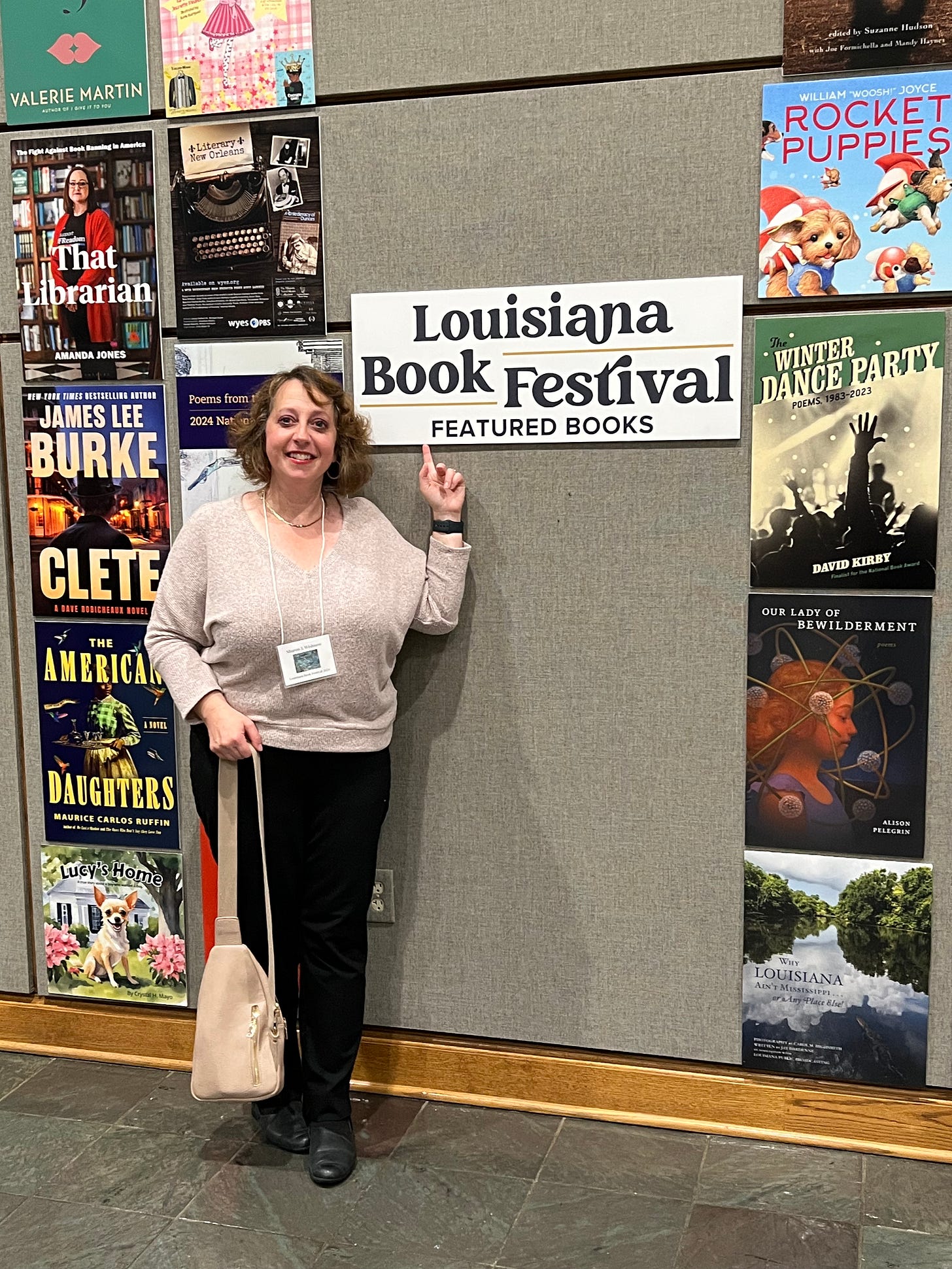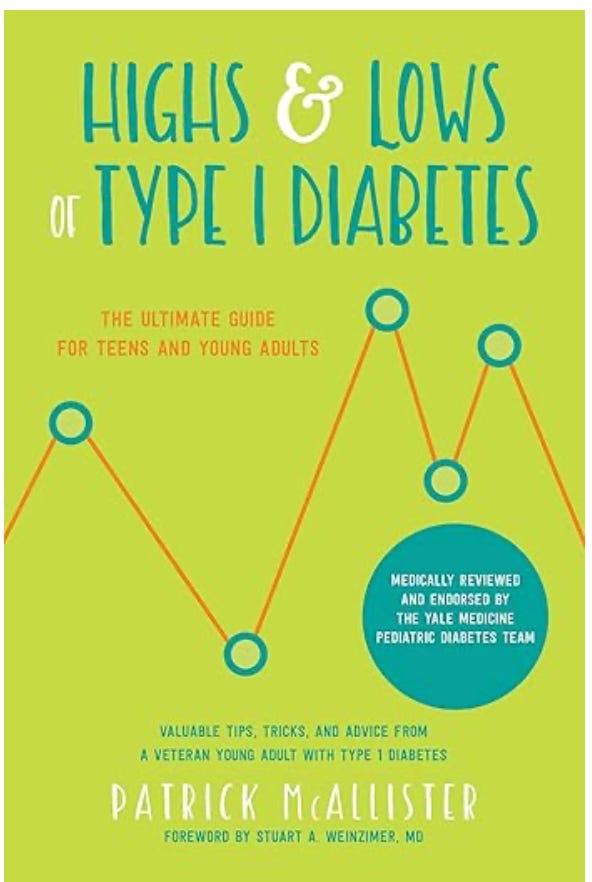Hello Curious Friends and Writers! I’ve been away from the Substack for a while. October was a wonderful and busy month for me with three book festivals: New Hampshire, Virginia, and Louisiana. I have lots to write about in the coming weeks including an emotional visit to Grand Isle, Louisiana where I met a Patrick Swayze look-alike, spent the evening drinking with the mayor, and fed real pelicans - even though you’re not supposed to.

I hope my adventures and how they’re inspiring my writing will keep you entertained. Today, I’m writing about diabetes and research and how you can too.
My Character is Sick!
I’ve been deep into drafting since The Pelican Tide arrived. I wrote a complete novel, 104k words! and then said, maybe this isn’t the next book.
I’ve returned to a story that I’m loving about sisters, one is a YouTube famous biologist and the other an airline pilot.
BTW: Female airline pilots are BADASS and I can’t wait to write about them.
I wrote about medical research in May.
Now I want to talk about a specific illness.
In the middle of my new family story is a twelve-year-old boy with Type 1 Diabetes (T1D) a chronic immune disorder where the pancreas stops making insulin, an essential hormone to live.
November is Diabetes Awareness Month
Illness, while frightening, offers an essential element to stories - conflict - internal to the body, emotional to the soul, and stressful to the lives around the character.
In seeking a chronic childhood illness I conducted a basic search. I found some doozies, such as Leukemia. Nope! I will never kill a child in a novel. Though I do have one short story, but that’s a different discussion. I couldn’t sustain the emotional energy to write a 400-page novel with such a devastating outcome. I also don’t want to write stories that bum my readers out.
A Sugary Thread
Fellow author and friend 1Sharon Kurtzman suggested Type 1 Diabetes and sketched out some points of emotional conflict that families experience that I describe as adjacent to the actual illness and the person who has it. It was perfect. And that sounds awful as I write it.
TID as it’s often shortened to, is a chronic illness. It changes your life, and in many ways defines it, but the disease can be managed.
I Don’t Know Anything About This
T1D sent me into a research panic. My usual research process didn’t work. I found hundreds of resources and defined a few gotchas.
The disease is managed by evolving and very cool medical technology such as continuous glucose meters, insulin pens, fast and slow acting insulin, and artificial pancreases - insulin pumps. What tech would I build into my character’s life? Was it age/stage dependent? Was the tech I was learning about current? Was it relevant to the story?
These treatment tools are also monitored through smart apps. Diet and carefully counting carbs and administering a correct dose of insulin (the bolus) is essential. Diabetics must manage highs and lows and a dozen of medical issues. Was this part of my story arc (yes!) and how was I to build it in?
Diabetes is a complex and personal disease. How does it define people and families? What are the financial costs? What are the limitations? What does it emotionally do to people? How would these issues impact my characters lives?
Start Where?
I needed a starting point. One of my research tricks is to find online support groups and listserves where people who have specific medical issues can ask questions and others provide answers. Facebook is another place to find specific communities. I only ever lurk. I never engage or communicate. These are not my spaces. I become a fly on the wall.
I began to understand a framework of commonalities, but I didn’t have enough to translate the medical questions into human terms. This is common for chronic illnesses. You don’t have a recovery story with T1D and every person is unique.
I called Mark
My friend Mark is a Type 1 Diabetic and he now has an insulin pump. I’ve watched him take his blood sugar, experienced him having a sugar low (super scary) and know him to be an athlete, actor/singer/dancer, father, and friend. He lives a full life. But until I asked if he would talk to me about growing up with diabetes, I had no idea about this all-consuming part of his life. The very fact I didn’t know piqued my interest.
Mark shared his diagnosis origin story. He discussed how he managed as a child, shared some personal stories, and talked about his family’s response. And he patiently let me ask questions.
I met Mark in college and lived across the hall from him for a whole year. Behind his door literally and metaphorically was a juggling act of staying healthy and living his life as a college student. It’s not that he didn’t share he had diabetes. He wrote a whole guidebook for specific people a just in case this happens do this. He just didn’t broadcast it.
From my research, I’ve learned that life with T1D is easier today than when my friend was first diagnosed. But all new diabetics must start at the beginning.
Mark and Sharon as primary sources is the gold standard for research. But their experiences didn’t track with my contemporary timeline. What is it like to be diagnosed and living with T1D today when there is new tech and a greater understanding of the disease in the world?
I don’t currently know any T1D kids. This is a secondary character in my story and I need to be careful not to fall into a research rabbit hole.
I needed it all pulled together. I didn’t have the time (or the patience) to spend hundreds of hours. Though maybe my story would be better if I did ¯\_(ツ)_/.
I searched my local library catalogue on Type 1 Diabetes and found this amazing book. Published in 2018, Patrick McAllister’s book is written for kids and young adults. This short and approachable book is for kids who are the age of my character. The book is honest, includes photos, and covers T1D dosing, sugar highs and lows, going to school, playing sports, and telling others.
For me, perhaps because I’m (ahem) older, holding a book in my hand makes me feel I’ve found my way. A guidebook to translate my friends’ stories and pull together all the research notes. Or maybe it was just lucky and I discovered a great shortcut.
I’m almost done with the first solid draft of this new book. If you’re a T1D diabetic or care or have cared for someone who is and you’re interested in being a sensitivity reader for my story please let me know.
In my next issue, you’ll meet Climate Fiction author Phil Gilvin. He and I have been discussing the world building strategies of dystopian fiction. I’m feeling dystopian post election (and that’s all I say about it.) Emotions always lead me to writing and I’m curious about the workings and beats of this genre. I hope you’ll tune in to that issue where I’ll be giving away an e-copy of Phil’s book Truth Sisters. - It’s really good!
Thanks for diving into Research for Writers and Other Curious People since my break. It’s great to be writing again. The Pelican Tide is still available and I’m booking online and in-person book clubs.
I’ve had the joy of reading an early version of Sharon’s debut novel The Lost Baker of Vienna coming in 2025 from Pamela Dorman Books.







